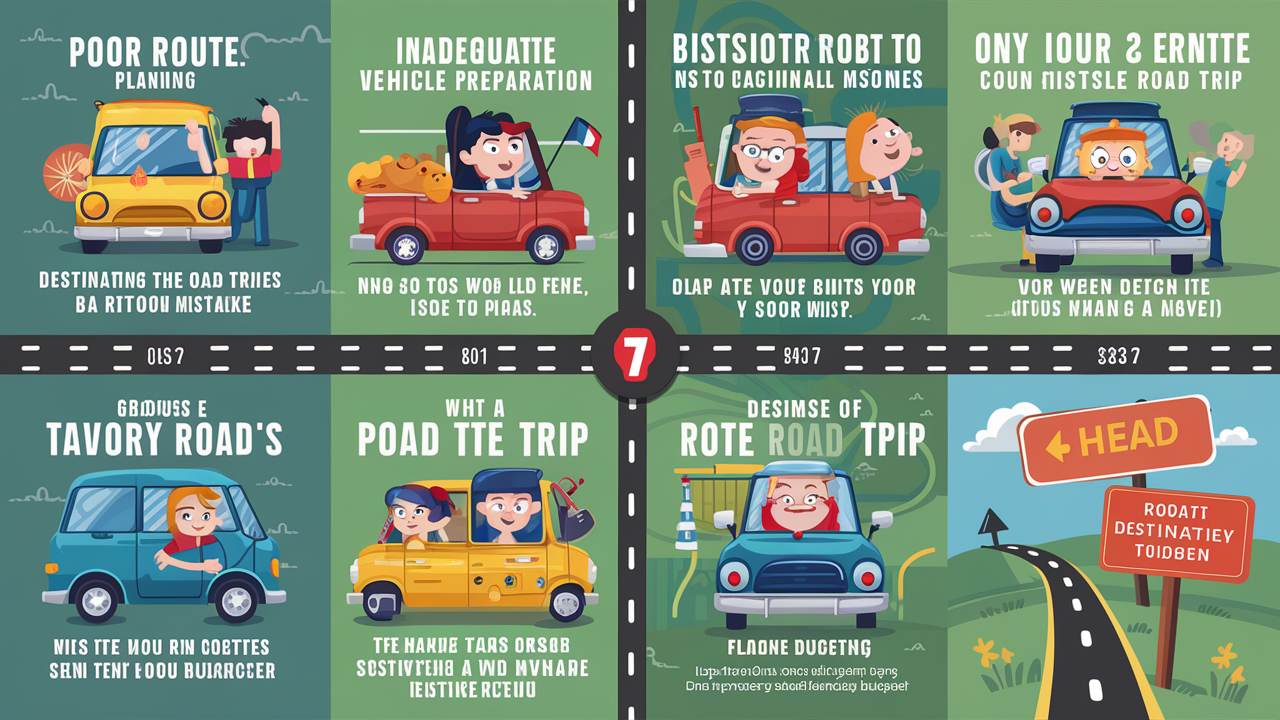Introduction:
Embarking on a road trip is a thrilling adventure, offering freedom, spontaneity, and the opportunity to explore diverse landscapes. However, despite the excitement, road trips can be marred by common mistakes that can turn a dream journey into a nightmare. In this guide, we will delve into seven common mistakes when taking a road trip and explore how to avoid them.
1. Underestimating Travel Time:
One of the most prevalent mistakes travelers make is underestimating travel time. Whether it’s due to optimistic planning or failure to account for unforeseen delays, setting unrealistic expectations can lead to stress and disappointment. To mitigate this, it’s essential to meticulously plan the route, factoring in breaks, meal stops, and potential traffic congestion. Utilizing GPS navigation tools and consulting online resources for estimated travel times can provide valuable insights into the journey’s duration.
2. Ignoring Vehicle Maintenance:
Neglecting vehicle maintenance ranks among the top mistakes that road trippers commit. A well-maintained vehicle is crucial for a smooth and safe journey. Prior to hitting the road, conduct a comprehensive inspection of your vehicle, checking tire pressure, fluid levels, brakes, lights, and wipers. Additionally, consider scheduling a professional tune-up to address any underlying issues and ensure optimal performance throughout the trip. Investing time and effort in vehicle maintenance can prevent breakdowns and disruptions along the way.
3. Overpacking:
Overpacking is a common pitfall for road trip enthusiasts eager to be prepared for every scenario. However, cramming excessive belongings into limited space can weigh down the vehicle and impede fuel efficiency. To avoid this mistake, adopt a minimalist approach to packing, focusing on essentials and versatile items that serve multiple purposes. Prioritize lightweight and compact gear, and consider the storage capacity of your vehicle when selecting luggage and equipment. Embracing simplicity not only maximizes comfort but also facilitates easier organization and accessibility during the journey.
4. Failing to Plan Accommodations:
Spontaneity is a hallmark of road trips, but failing to plan accommodations can lead to unnecessary stress and inconvenience, especially during peak travel seasons. While flexibility is desirable, it’s prudent to research and reserve accommodations in advance, particularly in popular tourist destinations and remote areas with limited lodging options. Leverage online booking platforms and mobile apps to secure accommodations that align with your budget and preferences. Additionally, consider alternative lodging options such as campsites, hostels, and vacation rentals to diversify your overnight stays and enhance the overall road trip experience.
5. Neglecting Safety Precautions:
Safety should always be a top priority when embarking on a road trip adventure. Neglecting safety precautions, such as seat belt usage, speed limits, and traffic regulations, can jeopardize the well-being of passengers and fellow travelers. Before setting off, familiarize yourself with local traffic laws and adhere to recommended safety practices, including designated rest breaks, defensive driving techniques, and emergency preparedness. Equip your vehicle with essential safety equipment such as a first-aid kit, roadside assistance tools, and emergency contact information to address unforeseen emergencies effectively.
6. Overlooking Budget Considerations:
Budgetary oversights can quickly derail road trip plans and strain financial resources. Overlooking budget considerations, including fuel expenses, accommodation costs, dining expenses, and recreational activities, can lead to unexpected financial burdens along the way. To avoid this mistake, establish a realistic budget encompassing all aspects of the journey, including contingencies for unforeseen expenses and emergencies. Monitor your spending throughout the trip and adjust your itinerary accordingly to stay within budget constraints. Leverage cost-saving strategies such as fuel-efficient driving habits, meal planning, and seeking out free or low-cost attractions to optimize your road trip experience without breaking the bank.
7. Failing to Embrace Flexibility:
While meticulous planning is essential for a successful road trip, failing to embrace flexibility can hinder the enjoyment of spontaneous discoveries and unexpected adventures. Rigidity in adhering to a predetermined itinerary can diminish the sense of freedom and exploration inherent in road trip experiences. Remain open to detours, scenic viewpoints, and serendipitous encounters along the way, allowing room for improvisation and adaptation to changing circumstances. Embrace the journey itself as the ultimate destination, savoring each moment and embracing the inherent unpredictability of the open road.
Conclusion:
Embarking on a road trip is a transformative experience, offering unparalleled opportunities for adventure, discovery, and personal growth. By avoiding common mistakes such as underestimating travel time, neglecting vehicle maintenance, overpacking, failing to plan accommodations, neglecting safety precautions, overlooking budget considerations, and failing to embrace flexibility, road trippers can optimize their journey and create lasting memories. By adhering to proactive planning, prudent decision-making, and a spirit of adventure, travelers can navigate the road with confidence and embark on unforgettable expeditions that redefine the essence of wanderlust.
